

25 Critical Thinking Strategies For The Modern Learner. Critical thinking is the engine of learning.
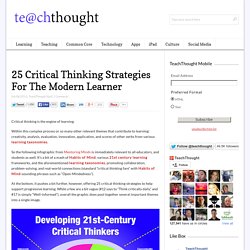
Make Close Reading Fun. Close reading has a reputation for being drudgery.
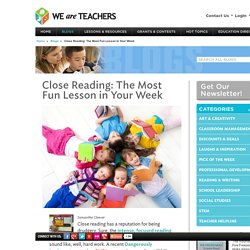
Sure, the intense, focused reading and rereading of text that defines close reading does sound like, well, hard work. A recent Dangerously Irrelevant post asks whether or not close reading will kill the joy of reading. To Teach Facts, Start with Feelings. Recently, we heard from a teacher who decided to create a more dynamic approach to his history class . . . by teaching it backward, starting with the present day.
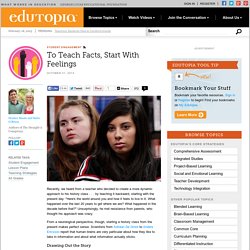
The MindShift Guide to Digital Games and Learning. Create, Integrate, Demonstrate - #ETTiPad. Personality test: what job would make you happiest? Work isn’t the only thing that influences happiness, but it’s where you spend a big chunk of your waking life.

Can it really make you happy? Many factors come into play – the role, the way you’re managed, the organisational culture, how much you like your colleagues – but work that matches your motivation and your interests is far more likely to keep you absorbed and reasonably contented. What’s Going on Inside the Brain Of A Curious Child? The Limbic Reward System lights up when curiosity is piqued.
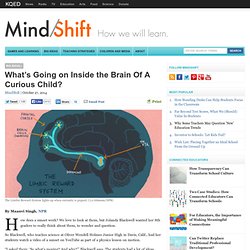
- edu Pulse. Powerful PD—one tweet at a time.By Kim Greene There comes a point when we have to acknowledge that one-size-fits-all professional development isn’t cutting it.
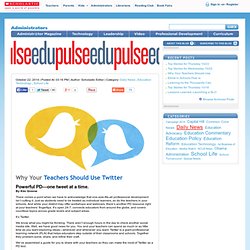
Just as students need to be treated as individual learners, so do the teachers in your schools. And while your district may offer workshops and webinars, there’s another PD resource right at your teachers’ fingertips. It’s open 24-7, connects educators from around the globe, and covers countless topics across grade levels and subject areas. Metacognition: The Gift That Keeps Giving. Editor's note: This post is co-authored by Marcus Conyers who, with Donna Wilson, is co-developer of the M.S. and Ed.S.
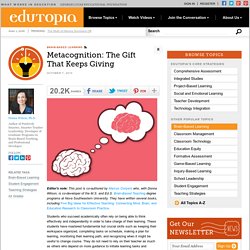
Brain-Based Teaching degree programs at Nova Southeastern University. They have written several books, including Five Big Ideas for Effective Teaching: Connecting Mind, Brain, and Education Research to Classroom Practice. Students who succeed academically often rely on being able to think effectively and independently in order to take charge of their learning. 23 Science-Backed Study Tips to Ace a Test. ’Tis the season to start studying.

All over the country, students in high school, college, and grad school are going into panic mode, wondering how they’ll manage to remember an entire semester’s worth of information before the big final. A veteran teacher turned coach shadows 2 students for 2 days – a sobering les... The following account comes from a veteran HS teacher who just became a Coach in her building.
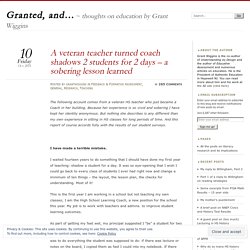
How Emotional Connections Can Trigger Creativity and Learning. What Guys Look For In Girls - A Slam Poem. 21 Cool Anchor Charts To Teach Close-Reading Skills. Giving a student a zero teaches them a lesson. Here is some of the common sense around giving kids zeroes that doesn't make a lot of sense and is far too common.
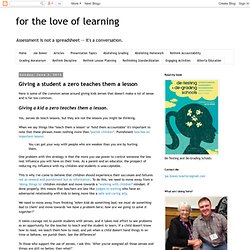
Giving a kid a zero teaches them a lesson. Yes, zeroes do teach lessons, but they are not the lessons you might be thinking. Quiz Yourself: How Good Are You at Teaching the Art of Learning? WizIQ-Sign In. 8ways - 2014 ABORIGINAL PEDAGOGY BOOK. My Teacher Is a Monster: A Sweet Modern Fable About Seeing Through the Othern... Four Skills to Teach Students In the First Five Days of School. Jane Mount/MindShift The first few days of school are a vital time to set the right tone for the rest of the year. Many teachers focus on important things like getting to know their students, building relationships and making sure students know what the classroom procedures will be.
Fritz Kahn: The Little-Known Godfather of Infographics. By Maria Popova How a German gynecologist transformed science into visual poetry and laid the foundations of modern information graphics. Around the time when Austrian sociologist, philosopher, and curator Otto Neurath was building his ISOTYPE visual language, which laid the foundation for pictogram-based infographics, another infographic pioneer was doing something even more ambitious: The German polymath Fritz Kahn — amateur astronomer, medical scientist by training, gynecologist by early occupation, artist by inclination, writer, educator and humanist by calling — was developing innovative visual metaphors for understanding science and the human body, seeking to strip scientific ideas of their alienating complexity and engage a popular audience with those essential tenets of how life works.
Shouldn’t Education and Learning Be the Same Thing? Schooling and institutionalized education have become removed from true, instinctual, and human/humane learning. Humans have been learning since the beginning of time with major discoveries and innovations historically and currently emerging in spite of school. This is the biggest problem I have with schools – most are contrived and coercive and do not honor the innate human need and desire to learn, discover, and evolve. If order to fully understand the purpose of school, the history of its evolution as an institution needs to be understood. What follows is part of A Brief History of Education in the Freedom to Learn series published in Psychology Today: If we want to understand why standard schools are what they are, we have to abandon the idea that they are products of logical necessity or scientific insight.
From the Time Magazine article, How to Bring Our Schools Out of the 20th Century. 4 Lessons New Teachers Never Learned But They Can’t Survive Without. If you are a new teacher, these four lessons just might impact your teaching career more than anything you ever learned in college or in your preservice days. If you are a veteran teacher or administrator, you owe it to your new teacher colleagues to share this with them and challenge them to seriously consider these lessons, as they represent the kind of reform that education sorely needs.
Education Week. How a Bigger Purpose Can Motivate Students to Learn. 6 Videos That Will Inspire You To Teach.
WATCH: Kitty Flanagan on feminism on The Project. Great Google Search Strategies Every Student Can Use - Infographic. Dipsticks: Efficient Ways to Check for Understanding. What strategy can double student learning gains? According to 250 empirical studies, the answer is formative assessment, defined by Bill Younglove as "the frequent, interactive checking of student progress and understanding in order to identify learning needs and adjust teaching appropriately. " Unlike summative assessment, which evaluates student learning according to a benchmark, formative assessment monitors student understanding so that kids are always aware of their academic strengths and learning gaps.
Meanwhile, teachers can improve the effectiveness of their instruction, re-teaching if necessary. The clark real thinking process. 31 Incredible Bulletin Boards For Back To School. 8 Tips and Tricks to Redesign Your Classroom. Editor's Note: Author David Bill is a designer and educator who consulted with The Third Teacher+ on the Remake Your Class project highlighted in the videos below. The tips in this post go along with the companion video. We are excited by the simplicity (and low price tag!) Of this great redesign. Hope you'll share any of your own tips in the comments area below. Cyberbullying. 15 Tips for Lining Up Your Class. Could Video Games Measure Skills That Tests Can’t Capture? A screenshot from the Posterlet game: choosing negative or positive feedback. The Epic BYOD Toolchest (51 Tools You Can Use Now)
Teacher Reboot Camp. Learning Theory - What are the established learning theories? Professional Learning Communities. What Kids Should Know About Their Own Brains. Getty Neuroscience may seem like an advanced subject of study, perhaps best reserved for college or even graduate school. Two researchers from Temple University in Philadelphia propose that it be taught earlier, however—much earlier. As in first grade. In a study published in this month’s issue of the journal Early Education and Development, psychologists Peter Marshall and Christina Comalli began by surveying children aged four to 13 to discover what they already knew about the brain.
Math concepts + teamwork = big gains at struggling Renton school. 5 TED Talks Teachers Should Watch With Students. WeAreTeachers - Photos du journal. 10 Team-Building Games That Promote Collaborative Critical Thinking. Three Good Tools for Building Flipped Lessons That Include Assessment Tools.